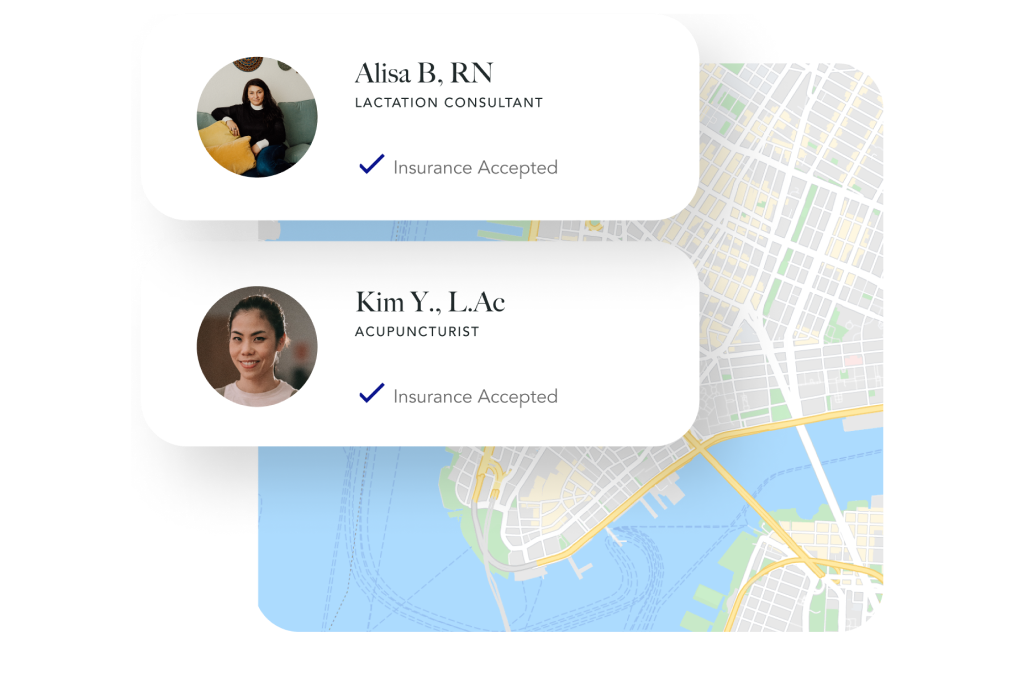
Need assistance? Call (646) 443-6113
Find PCOS Nutritionists Near You
90% of Zaya patients pay $0 for one-on-one nutrition counseling with a registered dietitian.
Find A PCOS Nutritionist Near YouBrowse our directory of vetted PCOS nutritionists — and book your visit online using your insurance.

Find the best care for you.

Pay with your insurance.

Book your visit online.
Get a provider who gets you.
Our expert nutrition providers prioritize quality, tailoring care to your unique needs.
Real talk from real patients.
Have questions? We’ve got answers.
Discover your best health. Explore the FAQs to discover how Zaya and top dietitians team up to empower people like you through top-notch care.
View FAQsMore about polycystic ovary syndrome & our PCOS nutritionists
What is polycystic ovary syndrome?
Polycystic ovary syndrome (PCOS) affects 1 in 10 women of childbearing age. This hormonal disorder is characterized by cysts on the ovaries, irregular periods, and excessive production of androgens (aka male hormones).
Unfortunately, the exact cause of PCOS is unknown. But, medical experts tend to agree that things like resistance to insulin, hormonal imbalances, and hereditary factors can be factors in its development. In addition to irregular menstrual cycles, women with PCOS may experience heavy bleeding, excessive hair growth, acne, weight gain, and problems with conception.
To effectively manage PCOS, women are encouraged to take a comprehensive approach. This typically means lifestyle modifications, medication, management of specific symptoms as well as guidance from experts to identify personalized nutrition solutions.
What causes PCOS?
As we shared above, the exact cause of PCOS is not fully understood and is a bit of a mystery. One primary cause could be insulin resistance, which affects the body’s ability to use insulin effectively, leading to increased insulin levels and hormone imbalances.
Low-grade inflammation within the body can also contribute to PCOS. Hereditary factors and excessive production of androgens, a group of hormones involved in reproductive health and body development, are other characteristics.
What are the symptoms of PCOS?
Polycystic ovary syndrome (PCOS) is associated with many symptoms, and the severity can vary from person to person. Common symptoms are:
- Irregular or absent menstrual periods
- Excessive hair growth on the face, chest, back, or buttocks (hirsutism)
- Acne or oily skin
- Weight gain or challenges losing weight
- Thinning hair or hair loss from the scalp
- Darkening of the skin, particularly in skin folds such as the neck, groin, and under the breasts
- Skin tags, which are small, excess flaps of skin
- Mood changes, such as depression or anxiety
- Sleep problems
- Difficulty getting pregnant or infertility
What are the risks of PCOS?
Polycystic ovary syndrome (PCOS) is a condition that carries various risks and potential complications. Some of the risks associated with PCOS include:
- Menstrual cycle irregularities. Many women with PCOS have irregular periods ranging from every other month to going several months without. Because your period is directly tied to ovulation, this can make it harder for a woman to conceive.
- Infertility. Similarly to the challenges caused by missed or irregular periods, hormonal imbalances and irregular ovulation associated with the ailment can make it harder for women to get pregnant.
- Metabolic syndrome. PCOS is often linked to metabolic syndrome, which includes factors like high blood pressure, high cholesterol levels, and insulin resistance. This combination of factors increases the risk of developing type 2 diabetes and cardiovascular problems such as heart disease and stroke.
- Weight gain and obesity. Many women with PCOS struggle with weight gain or obesity, which can exacerbate the risk of developing metabolic complications and contribute to insulin resistance.
- Endometrial cancer. When estrogen levels are high for long periods of time, and a woman is experiencing irregular periods, it can lead to the overgrowth of the uterine lining (endometrium), increasing the risk of endometrial cancer.
When to see a PCOS nutritionist
You should consider working with a PCOS nutritionist if you:
- Have been diagnosed with PCOS. A nutritionist specializing in PCOS can provide women with customized and personalized dietary guidance tailored to their specific needs. Knowing better what to eat and how often can help manage some of the challenges associated with the condition.
- Want to manage weight. Maintaining your weight is critical when trying to manage PCOS. A PCOS nutritionist can help you develop a customized meal plan that promotes healthy and safe weight loss and long-term weight maintenance while ensuring you get the nutrients you need.
- Need support in improving insulin resistance. Insulin resistance is a common characteristic of PCOS. A nutritionist can help you optimize your diet to manage insulin levels and improve insulin sensitivity.
- Want to regulate menstrual cycles and improve fertility. Nutrition plays a crucial role in regulating hormonal balance and improving fertility. A PCOS nutritionist can guide you in incorporating foods that support hormonal health and may make it easier for you to conceive.
- Seek to manage symptoms. What you eat can influence PCOS symptoms such as acne, hirsutism (excessive hair growth), and hair loss. A nutritionist can recommend nutrient-rich foods and dietary strategies that may help manage and mitigate these symptoms.
- Wish to adopt a PCOS-friendly diet. The PCOS diet focuses on consuming whole, unprocessed foods such as fruits and vegetables, nuts, seeds, legumes, whole grains, lean fish, and eggs. An emphasis is placed on nutrient-dense choices and balancing macronutrients. A PCOS nutritionist can educate you about the principles of a PCOS-friendly diet and provide practical tips for meal planning and food choices.
How Zaya Care’s PCOS nutritionists can help
Dietitians offer valuable support to individuals with PCOS, providing evidence-based guidance and personalized care. In the initial appointment, a PCOS nutritionist conducts a comprehensive assessment to understand your medical history, current diet, lifestyle, and goals related to PCOS management.
They work collaboratively with you to create a tailored meal plan that addresses key aspects of the PCOS diet, such as managing insulin resistance, supporting hormonal balance, and promoting weight management. And they take your preferences into consideration, too, so you don’t have to worry about sticking to a diet of foods you dislike.
PCOS nutritionists offer education on label reading, portion control, and making informed food choices, as well as strategies to manage cravings, improve insulin sensitivity, regulate menstrual cycles, and enhance overall well-being.
By working with a top PCOS nutritionist through Zaya Care, you can gain the knowledge and tools to optimize your nutrition, manage PCOS symptoms, and improve your quality of life.
Benefits of working with a Zaya Care PCOS nutritionist
Working with a Zaya Care PCOS nutritionist can offer so many benefits for women with PCOS, via our online directory, digital resources, and virtual or in-person visits.
These specialized nutritionists have in-depth knowledge and expertise in managing diet and lifestyle modifications. By tailoring their recommendations to your health goals and needs, they can create a customized plan that helps you manage your PCOS in the best way possible.
PCOS nutritionists specialize in optimizing nutrition to address specific aspects of PCOS, such as insulin resistance and hormonal balance. They will teach you about the PCOS diet, which involves incorporating nutrient-dense foods, managing carbohydrate intake, and promoting balanced meals that help address all those issues that PCOS brings.
Additionally, PCOS nutritionists offer guidance on lifestyle modifications like regular physical activity, stress management, and a good night’s sleep to support overall well-being. PCOS nutritionists understand the impact of diet and lifestyle on hormonal balance and fertility, providing recommendations to support hormone regulation and optimize fertility outcomes for women trying to conceive.
Regular follow-up appointments with a PCOS nutritionist offer ongoing support and accountability. They help monitor progress, adjust the plan as needed, and provide guidance in overcoming challenges. Continuous support from a nutritionist who specializes in PCOS can increase motivation, adherence to the recommended lifestyle changes, and overall success in managing PCOS.
How Zaya Care creates a trusted path to top-quality PCOS care and nutrition
At Zaya Care, we stand apart in PCOS care, redefining the landscape by prioritizing accessibility, personalization, and affordability. Our mission is to democratize specialized healthcare, making it more accommodating and easier to navigate. We partner with nutritionists and registered dietitians to ensure that your wellness journey is not only practical but also more affordable.
Zaya Care nutritionists and registered dietitians specialize in nutrition counseling, leveraging digital platforms, hosting convenient appointments, and creating wellness strategies unique to you and your needs.
Our team comprises trusted allies committed to helping you achieve your specific health goals. What sets us apart is our dedication to expanding insurance coverage for healthcare providers and making quality, personalized care more accessible to insured individuals across the US.
In a healthcare environment dominated by large systems, Zaya Care advocates for the voices of smaller, boutique private practices. We believe in the power of vetted, trusted healthcare providers and champion their importance in improving overall wellness. Through Zaya, more providers now accept insurance for the first time, bridging the gap and enhancing access to quality, best-in-class care. Experience the Zaya difference—where personalized nutrition meets affordability, and your overall well-being is the top priority.
PCOS Nutrition Resources
- PCOS Diet: Meal Plan & Foods to Avoid
- Why Does PCOS Weight Gain Happen?
- How to Lose Weight With PCOS
- PCOS Weight Loss Medication Options
- Is the Keto Diet Good for PCOS?
- What Does a PCOS Belly Look Like?
- Supplements That Can Help With PCOS Weight Loss
- PCOS Diet for Fertility Issues
- Are Dietitian & Nutritionist Visits Covered by Insurance?
>> Search for a PCOS nutritionist




